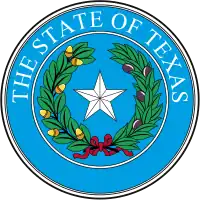2006 United States Senate election in Texas
The 2006 United States Senate election in Texas was held November 7, 2006. Incumbent Republican Kay Bailey Hutchison won re-election to a third full term.
| |||||||||||||||||
| |||||||||||||||||
 County results Hutchinson: 40–50% 50–60% 60–70% 70–80% 80–90% >90% Radnofsky: 50–60% 60–70% 70–80% | |||||||||||||||||
| |||||||||||||||||
| Elections in Texas |
|---|
 |
|
|
As of 2022, this was the last time a Republican won Texas’s Class 1 Senate seat with over 60% of the vote, as well as the last time a Republican candidate for this seat won Dallas, Jefferson, or Bexar counties.
To date, this is the most recent statewide election in which Dallas County voted for the Republican candidate.
General election
Democratic
- Barbara Ann Radnofsky, attorney
- Gene Kelly, retired attorney & 2000 Democratic Senate Nominee
- Darrel Reece Hunter
Republican
- Kay Bailey Hutchison, incumbent U.S. Senator
Campaign
The Democratic nominee had never run for public office and was expected to face an uphill battle in the general election, especially in a state that has not elected a Democrat statewide since 1994 and against a historically popular Hutchison. Since neither Radnofsky nor her main opponent, Gene Kelly, had received a majority of votes in the Democratic primary, a runoff was held April 11, 2006, which Radnofsky won. Radnofsky's campaign platform is available on her website.[1] Scott Lanier Jameson won the Libertarian Party nomination at the party's state convention on June 10, 2006, defeating Timothy Wade and Ray Salinas. Arthur W. Loux, a Roman Forest City Councilman and a member of the Minutemen, was running as an independent.
Hutchison co-sponsored legislation supporting the creation of a constitutional amendment that would limit terms for senators, but had been quoted saying that she would only leave after two terms if such a law applied to all senators. After deciding not to challenge Governor Rick Perry this year, as had been widely speculated, Hutchison was running for a third term.
She had no opposition in the 2006 Republican primary, and had approval ratings in the 60 percent range going into the election,[2] although they had been slipping rapidly.
Debates
- Complete video of debate, October 19, 2006
Predictions
| Source | Ranking | As of |
|---|---|---|
| The Cook Political Report[3] | Solid R | November 6, 2006 |
| Sabato's Crystal Ball[4] | Safe R | November 6, 2006 |
| Rothenberg Political Report[5] | Safe R | November 6, 2006 |
| Real Clear Politics[6] | Safe R | November 6, 2006 |
Polling
| Source | Date | Hutchison (R) | Radnofsky (D) |
|---|---|---|---|
| Polimetrix | November 5, 2006 | 65% | 29% |
| Zogby | October 25, 2006 | 61% | 27% |
| Rasmussen | October 23, 2006 | 60% | 34% |
| Rasmussen | August 31, 2006 | 58% | 32% |
| Rasmussen | August 3, 2006 | 61% | 31% |
| Rasmussen | July 13, 2006 | 58% | 31% |
| Rasmussen | May 18, 2006 | 53% | 34% |
| Rasmussen | January 8, 2006 | 64% | 25% |
Results
| Party | Candidate | Votes | % | ±% | |
|---|---|---|---|---|---|
| Republican | Kay Bailey Hutchison (incumbent) | 2,661,789 | 61.69 | -4.65 | |
| Democratic | Barbara Ann Radnofsky | 1,555,202 | 36.04 | +3.69 | |
| Libertarian | Scott Jameson | 97,672 | 2.26 | +1.10 | |
| Majority | 1,106,587 | 25.7 | |||
| Turnout | 4,314,663 | ||||
| Republican hold | Swing | ||||
See also
References
- "Radnofsky Mediation Services". Radnofsky.com. Retrieved March 21, 2022.
- "SurveyUSA News Poll #9993".
- "2006 Senate Race Ratings for November 6, 2006" (PDF). The Cook Political Report. Archived from the original (PDF) on June 5, 2008. Retrieved September 30, 2021.
- "Election Eve 2006: THE FINAL PREDICTIONS". Sabato's Crystal Ball. November 6, 2006. Retrieved June 25, 2021.
- "2006 Senate Ratings". Senate Ratings. The Rothenberg Political Report. Retrieved June 25, 2021.
- "Election 2006". Real Clear Politics. Retrieved June 25, 2021.
- "2006 General Election". Texas Secretary of State. November 7, 2006.
External links
- Official campaign websites (Archived)

.jpg.webp)